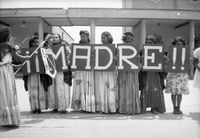Every year on May 10, Mexico celebrates Mother's Day, a tradition that has deep historical roots tied to the feminist movement in the country. However, this celebration is not merely a tribute to motherhood; it has evolved from a contentious backdrop of the early 20th century's social struggles. The origins of this day are intricately linked to the fight for women's rights, particularly concerning the concepts of desired motherhood and birth control.
The story begins in 1916 with the first Feminist Congresses in Mexico, held in Yucatán, where pioneering women like Elvia Carrillo Puerto and Hermila Galindo advocated for women's education, the right to vote, divorce, and the choice of motherhood. During this time, discussing such topics was taboo and met with significant resistance from conservative sectors of society.
By 1922, feminist groups in Yucatán published a pamphlet titled "La Brújula del hogar: Medios seguros y científicos para evitar la concepción," written by Margaret Sanger, a nurse and activist for sexual education. Sanger's ideas significantly influenced the work of Carrillo Puerto and other members of the Liga Feminista Rita Cetina, who pushed for initiatives surrounding birth control and women's rights.
Upon Felipe Carrillo Puerto's rise to power in Yucatán, the government initiated a birth control campaign. However, this effort faced fierce backlash from local newspapers, conservative groups, and religious factions. The national opposition intensified when, on April 13, 1922, Rafael Alducin, founder of the newspaper Excélsior, published a call to establish a date to honor mothers in Mexico. He declared, "A suicidal and criminal battle against motherhood has been launched. When, in Yucatán, official elements have not hesitated to engage in grotesque propaganda denigrating the highest function of women, it is essential for society as a whole to manifest itself."
This rallying cry led to the establishment of May 10 as an annual commemoration of mothers. The first official celebration took place in 1922 across various states in Mexico. Thanks to Excélsior and its campaign against birth control, this tradition took root in Mexican culture. Over the years, however, the meaning of Mother's Day has shifted due to the activism of mothers of femicide victims, mothers searching for justice, and countless women who march for their rights amid rising violence in Mexico.
May was chosen for this celebration due to its traditional association with the Virgin Mary, a central figure in Catholic devotion and a universal symbol of motherhood in Christian traditions. The 10th of the month was strategically selected because many workers received their paychecks on the 10th and 25th, making it easier for families to celebrate with gifts or special meals.
While 1922 marks the official start of Mother's Day in Mexico, some sources suggest that an earlier celebration occurred in Oaxaca in 1913. A Methodist pastor's wife reportedly discovered the concept in an American magazine and brought the idea to her community, indicating that the notion of honoring mothers was already circulating in certain social and religious circles.
With the establishment of this holiday in 1922, Mexico became the first Latin American country to officially recognize Mother's Day. The tradition not only persisted but also became deeply embedded in the collective consciousness of the nation. A testament to this is the construction of the Monument to the Mother in Mexico City in 1949, dedicated to celebrating the maternal figure as a moral and social pillar of the nation.
Over time, despite its religious and nationalistic origins, Mother's Day in Mexico has transformed into a day of emotional and cultural recognition. In recent decades, it has become an occasion to appreciate mothers for their efforts, tenderness, understanding, and daily commitments. The symbolism behind honoring mothers is not a modern invention; various cultures have revered maternal figures throughout history. Ancient Greece celebrated Rhea, the goddess of fertility and mother of the Olympian gods. In Rome, worship was directed at Cybele, the protector of the earth, while in Egypt, Isis was venerated as the mother goddess of the universe.
As Christianity spread, many of these female representations coalesced around the Virgin Mary, whose feast day on December 8 has long served as the main occasion for honoring motherhood in Christian nations.
The modern iteration of Mother's Day, as celebrated in many countries today, originated in the United States in the mid-19th century. In 1865, activist Ann Maria Reeves organized meetings for mothers to discuss common issues. This movement was later advanced by Julia Ward Howe, who wrote the "Mother's Day Proclamation" in 1870, advocating for peace among nations through solidarity among mothers worldwide. In 1907, following the death of a founder’s mother, a request was made to the U.S. government to declare the second Sunday in May as Mother's Day, which was officially recognized in 1914 under President Woodrow Wilson.
This American model of celebration has been adopted by various countries, including Colombia, Venezuela, Japan, and several European nations. In contrast, Mexico has maintained its original date without alterations. Each year, May 10 is a festive occasion in most schools, offices, and media outlets, featuring special programs, artistic performances, and public tributes. Flower sales, gifts, and dining services soar, making this one of the most commercially significant dates on the national calendar.
While the origins of Mother's Day in Mexico are multifaceted, intertwining religious, historical, social, and commercial influences, it transcends a mere calendar celebration. It is a day that allows for renewed recognition of a central figure in the emotional and social structure of the country. More than a century after its potential first celebration in Oaxaca and over a hundred years since its national consolidation, Mother's Day remains one of the most deeply rooted traditions in Mexican culture.
In a recent message ahead of Mother's Day, President Claudia Sheinbaum Pardo expressed her heartfelt congratulations to all mothers, highlighting the extraordinary nature of motherhood and acknowledging its challenges. She emphasized, "It is time for women!" as she addressed the nation from Palacio Nacional, reinforcing the importance of recognizing mothers' roles in society.






